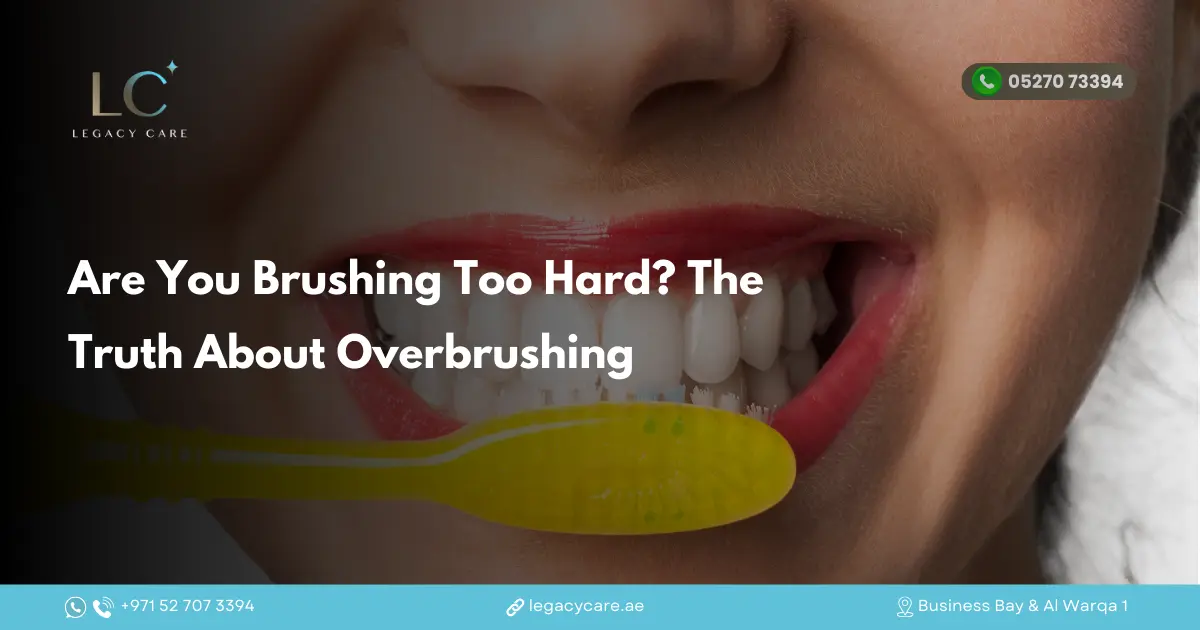Most people think the harder they brush, the cleaner their teeth will be. It feels like common sense—scrub harder, get rid of more dirt. But teeth don’t really work that way. In fact, brushing too hard can damage them.
I’ve met people who brush so hard that their toothbrush looks worn out in just a few weeks. They think they’re doing a good job, but what’s really happening is they’re slowly wearing down their enamel and hurting their gums.
What Overbrushing Does
When you press too hard with your brush, a few things can happen:
- The enamel gets thinner. Enamel is the tough outer layer of your teeth. Once it wears away, it doesn’t grow back.
- Gums pull back. This is called gum recession. Your teeth start to look longer, and the roots can get exposed.
- Teeth feel sensitive. Cold water, hot tea, or even sweet foods can suddenly give you a sharp pain.
- Your mouth doesn’t actually get cleaner. Gentle brushing does the job better than scrubbing hard.
Signs You Might Be Brushing Too Hard
It’s not always easy to notice. But here are a few hints:
- Your gums bleed often when brushing.
- The bristles on your brush bend and spread out quickly.
- Your teeth look yellow even though you brush every day (that’s the enamel wearing off).
- Sensitivity is getting worse.
If this sounds familiar, it might not be your toothpaste—it could be your brushing.
How to Brush the Right Way
Dentists usually suggest a soft approach:
- Use a soft-bristled toothbrush. Hard bristles don’t mean better cleaning.
- Hold the brush at a small angle, not straight up and down.
- Use small, gentle circles, not hard scrubbing.
- Two minutes, twice a day, is enough.
If you use an electric brush, don’t push it into your teeth. Just let it glide.
A Real Example
One of my cousins used to brush like he was scrubbing a dirty pot. He even felt proud about it. After a few years, he started to complain that his teeth hurt whenever he had ice cream. At the dentist, they told him his enamel had worn down and his gums were starting to recede.
He switched to a soft brush and learned the lighter technique. It didn’t fix the enamel, but the pain didn’t get worse. Sometimes less really is more.
Don’t Confuse Overbrushing with Skipping Brushing
Of course, not brushing enough is still worse. Skipping brushing leads to plaque, cavities, and bad breath. The key is balance—gentle, regular brushing with the right method.
Small Tips That Can Help
- Try using your weaker hand to brush—it naturally puts less pressure.
- Think of brushing as polishing, not scrubbing.
- If you’re not sure, ask your dentist to show you. It only takes a minute to learn the motion.
Final Words
Brushing your teeth shouldn’t feel like hard work. If your gums are sore, your brush looks flat, or your teeth feel more sensitive, you might be brushing too hard.
A clean smile comes from brushing the right way—not the hardest way.
So next time you pick up your brush, go easy. Your teeth will thank you later.
📍 Book a visit at Business Bay or Al Warqa 1
📞 Call +971 527073394
📅 Book Online: https://www.legacycare.ae/book-appointment/

